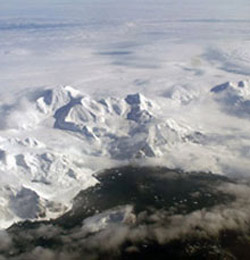 |
 |
 |
 Editorials | Environmental | August 2005 Editorials | Environmental | August 2005  
Collapse of Antarctic Ice Shelf Could Have Global Effects
 Canadian Broadcasting Corporation News Canadian Broadcasting Corporation News


| | Larsen ice shelf (Photo: Queen's University) |
The unprecedented collapse of an ice-shelf in Antarctica could indirectly lead to a significant rise in global sea levels, researchers say.

The Larsen B ice shelf covered more than 3,000 square kilometres and was 200 metres thick until its northern part disintegrated in the 1990s. Three years ago, the central part also broke up.

An international team of researchers used data collected from six sediment cores near the former ice shelf to show the shelf had been relatively intact for at least 10,000 years or since the last ice age.

The collapse therefore goes beyond what would be expected naturally at the time. Rather, the demise is likely the result of long-term thinning due to melting from underneath, as well as short-term surface melting from global climate change, the researchers suggest.

Then in five years, the shelf shrunk by 5,700 square kilometres, say scientists who found the break up caused changes in currents and species in the area.

"As the ice shelves are disintegrating, the glaciers that are feeding them from the land are surging forward," said Robert Gilbert, a geography professor at Queen's University in Kingston, Ont.

Glaciers are no longer being held back from the ice shelf, and are pushing ice bergs into the sea, said Gilbert, one of the co-authors of the study in Thursday's issue of the journal Nature.

As the glaciers melt, global sea levels could change more than predicted, he said. Flooding could result in low-lying areas.

Scientists are now watching to see if the most southern part of the Larsen ice shelf, the coldest part of Antarctica, is going to break up. | 
 | |
 |



